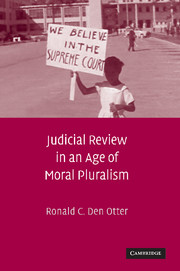Book contents
- Frontmatter
- Contents
- Acknowledgments
- Introduction
- 1 Public Justification and Constitutional Theory
- 2 Freedom and Equality in Constitutional History
- 3 The Challenge of Public Justification
- 4 Competing Conceptions of Public Reason
- 5 Constitutional Public Reason
- 6 The Limits of Public Justification
- 7 Standard Objections to Public Reason
- 8 Easier Cases
- 9 Harder Cases
- 10 The Case for Judicial Review
- Conclusion
- References
- Index
- References
2 - Freedom and Equality in Constitutional History
Published online by Cambridge University Press: 17 December 2010
- Frontmatter
- Contents
- Acknowledgments
- Introduction
- 1 Public Justification and Constitutional Theory
- 2 Freedom and Equality in Constitutional History
- 3 The Challenge of Public Justification
- 4 Competing Conceptions of Public Reason
- 5 Constitutional Public Reason
- 6 The Limits of Public Justification
- 7 Standard Objections to Public Reason
- 8 Easier Cases
- 9 Harder Cases
- 10 The Case for Judicial Review
- Conclusion
- References
- Index
- References
Summary
In the previous chapter, I described the limitations of formalist approaches to constitutional adjudication to explain why judges often must look outside the law for normative guidance. That is why an ideal of public justification is indispensable to constitutional adjudication. In this chapter, I begin to articulate what public justification is, why it is important, what it can accomplish, and how it could guide judges when they delineate the constitutional limits on the coercive power of the state. In particular, I will explain how such a normative standard would facilitate the evaluation of the quality of constitutional arguments, thus making it possible to know when a public law or judicial decision is sufficiently publicly justified and therefore legitimate. That does not mean that a standard of public justification would dictate a single result in a hard constitutional case or that all reasonable people would always agree that the judicial opinion in question meets or fails to meet that standard. After all, legal reasoning never has been, and never will be, deductive. At the same time, when discretion is inescapable, I will show how such a standard would not only generate the right answers in easy cases but also help judges to identify the relevant reasons and weigh them appropriately even in the hardest of hard cases. The use of such a standard would clarify what counts as a good or bad reason in constitutional decision making and address the skeptical worry that there is no right or better answer to the most important constitutional questions.
- Type
- Chapter
- Information
- Judicial Review in an Age of Moral Pluralism , pp. 52 - 80Publisher: Cambridge University PressPrint publication year: 2009



